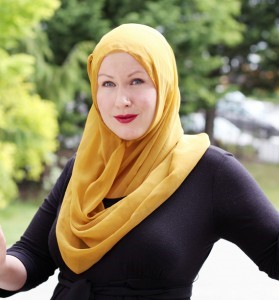‘All In and All Out’: Examining Islam in G. Willow Wilson’s Graphic Novels
By A. David Lewis
ISLAMiCommentary
When Publishers Weekly called G. Willow Wilson “a talented young writer” almost a decade ago, they likely had no idea of the superstar status she would earn over the next several years. Though Wilson is probably most well known as the writer of the new Ms. Marvel comics series — whose superheroine, Kamala Khan, is a teenage Pakistani-American Muslim/Jersey-born shape-shifting fangirl and Marvel’s first Muslim leading lady — her first graphic novel, Cairo, remains a raw and enduring hallmark for what this evolving Muslim writer can do.
The 2007 Vertigo graphic novel Cairo with artist M.K. Perker was Wilson’s debut in the comics medium but was informed by years of writing as a journalist in Boston and, later, in real-world Cairo itself. A graduate of Boston University, she cut her teeth in journalism for Boston’s Weekly Dig magazine before moving on to New York Times Magazine, the Atlantic Monthly, and life in Cairo itself for half a decade.
- Willow Wilson
These autobiographical elements can be found spread across two of the ensemble of main characters in Cairo: Kate, the bright-eyed and out-of-place young American reporter, and Jibreel, the jaded, frustrated, yet idealistic veteran Egyptian journalist. The two are thrown into the misadventures of Ashraf, a charismatic scoundrel and reluctant marijuana-smuggler; Tova, a lost Israeli Mossad agent with principled opposition to serving in the Occupied Territories; Shaheed, a confused Lebanese-American teen lured by the dark appeal of becoming a suicide bomber; and Shams, the jinn (spirit) who befriends and guides Shaheed towards a more noble purpose.
Through a series of either coincidences or, alternately, destiny, the five humans find themselves at first opposing and then allying themselves with Shams as malevolent forces vie with them for an impossible box, one that is said to contain the word East within it — the essence and power of the word itself.
True to Wilson’s background as a journalist and convert to Islam, it’s a word, language, which has value and holds hope for the future. True, also, as her earliest work in comics, the place of the visual or the hybridity of the visual and verbal has yet to be explicitly addressed.
By 2012, Wilson proved herself able to change registers — shifting between the primacy of the verbal and the visual – fluidly and across media. Nearly just as much buzz was generated around Wilson’s 2012 prose novel Alif the Unseen, a New York Times Best-Seller and winner of the 2013 World Fantasy Award for Best Novel, as 2014’s Ms. Marvel. The titular Alif has none of Kamala’s superpowers but an equal share of adventures.
Whereas Ms. Marvel splits her time between the superheroic and the Islamic (as well as the adolescently sophomoric), Alif inhabits a similarly hybrid world of mystic dangers and secular technophilia, often blurring the two. Michael Muhammad Knight, no stranger to blended worlds, praises Wilson, calling her “an awesome talent. She made her own genre and rules over it.”
I would argue, though, that it is Cairo, Wilson’s first work in comics, where she most rules her world, one in which Islam isn’t just a religion — it’s a recognized force of the universe.
To be clear, Islam itself and Muslim characters play a large role in much of Wilson’s other works. In Ms. Marvel, the title character must balance her life between the expectations of her family, the responsibility of her newfound powers, and her personal morals that underlie both. Yet, the character functions in a preexisting Marvel universe, a world environment where mutants are feared, extraterrestrials walk among us, time-travelers hop in and out of our era, and alternate realities lay very close at hand.
There are many forces in the Marvel universe that are to be recognized and respected, among them the “Terrigen Mists” — the DNA-activating gaseous mutagen that can trigger superpowers. (This is actually a current plot-line on the Agents of S.H.I.E.L.D. television series as well.) It’s from this sci-fi, cosmic source that Ms. Marvel gets her incredible powers, with her faith and her principles guiding them, not catalyzing them.
Similarly, in Alif the Unseen, the protagonist-hacker enters into the world of supernatural beings and powers via his own skills with computers, programming, and high-tech networks. Like Kamala, Alif is actively engaged with his faith and, in turn, his family, but his is not a strictly pious life. Perhaps it is his inner core of faith, and the way he gently challenges some of his society’s assumptions and practices, that allows him to engage with jinns, imams, and mystics alike, moving between both seen and unseen worlds with relative ease.
Conversely, an unnamed American convert character in Alif the Unseen has difficulty in perceiving and navigating the otherworldly “Immovable Alley” when Alif’s comrades journey there. (The “Immovable Alley” is a supernatural “in-between” place to which Alif and his allies gain access for seeking help — think Harry Potter’s “Diagon Alley.”)
“She’s an American” is the best explanation given for the American convert character, “Half in, half out” (163). Little more is said to clarify the statement, suggesting that if readers themselves are unclear as to its significance, they, too, are likely caught in the half-space, too.
When asked if the unnamed convert in Alif was some autobiographical comment, Wilson demurred, writing that “She’s a reversal of the unnamed/underdeveloped minority character who is simply there to dispense advice [to the] white hero” and “She provides access to spaces the other characters wouldn’t normally traverse. And emotional counterpoint.”
Alif, conversely, is all in and all out — finding ways to blend technology and the uncanny, the secular and the sacred, in a way that makes such distinct delineations so much more porous.
Yet, one does not get the solid impression, necessarily, that Islam reigns supreme in the mechanics of Alif’s universe. As in Ms. Marvel, there are many sources of power, from the mundane to the mystical. And their precise connection to Allah, the Qur’an, or Mohammed remains unconfirmed — such connections in the novel remain a matter of faith. This does not diminish or undercut either of these Wilson works; in fact, using a light touch with regard to religion and belief may not only have been intentional on her part but, in fact, entirely the point. Would a narrative where a religion is confirmed be too alien from our own? Would a story that loudly asserts Islam’s primacy thwart its own message to readers?
Cairo is distinctly different from Ms. Marvel, Alif the Unseen, and Wilson’s 2008-2010 comics series Air; the story of an American airline attendant’s foray into the uncanny realm of hyperpraxis, world-warping psychic flight. While all of them agree with the moral and peaceful messages of Islam, Cairo most directly affirms the centrality of the religion itself.
In Cairo, one can see some of the characters that later appear in Air, a setting similar to that ofAlif the Unseen, and a negotiation with the hybridity of word and image itself that can be found in Ms. Marvel. Cairo has much more of a cinematic feel than Ms. Marvel that so nimbly plays with comics layout and style, no doubt due in part to the skills of artist Adrian Alphona.
And it reads as Wilson’s most unabashed embrace of Islam as the center of her narrative. The pages of Cairo may be populated with the same flavor of the beyond or bizarre — the jinns, demons, and revealed lore that imbue Alif the Unseen — but in Cairo’s case all of these otherworldly beings are compelled to be reverential to Islam. Shams – a jinn, remember – directly advocates for the Qur’an; the magical Companion Sword can only be wielded through acts of submission; and, of course, if a flying carpet has to be featured, it must be a prayer mat. Each Orientalist token is shot through with redeeming Islamicism, without, notably, being outwardly Islamist.
What readers discover by Cairo’s end is that the box, supposedly containing the powerful essence of the word East, contains nothing for those unworthy of it — the power-hungry or the aggressive.
“This is the word East in the divine language of absence. It means whatever those to whom the box is given wish it to mean. For three hundred years the box belonged to people who didn’t live in the East, who judged it and sold it from far away; who feared it and diminished it,” explains Shams. “I recovered the box fifty years ago, but it’s been in danger ever since” (Wilson 137). Perhaps Wilson was at her most daring here, in her first foray into comics and before she became an industry superstar: In Shams’ mouth, she is calling for little less than for the Western colonial enterprise to be over, for 20th-century Middle Eastern hegemonies and dictatorships to be overturned, and for a return to words of truth.
“The task has passed to you,” Shams tells Shaheed as much as the reader. “Give the word back to the people who live it. Find someone who can speak it truthfully.” (137) Shaheed gives it to the able and well-named Jibreel, who shares the Arabic name of the angel Gabriel, the divine messenger of the Qur’an’s content to Muhammed. With the box in his possession, this Jibreel in Cairo promises to bring the city back to literate enlightenment by means of his own words.
Like Saladin Ahmed’s Throne of the Crescent Moon or Matt Ruff’s The Mirage, Wilson’s Cairo brings Islam from a theme or a topic of her work into its very system. In Ruff’s The Mirage, a jinn can convert to Islam and be immune from a “master’s” command. In Ahmed’s Throne of the Crescent Moon an ersatz Islam can be exerted to combat the evil, unclean, and undead.
In Cairo, unique among Wilson’s works, a return to truth, the reestablishment of too-long-corrupted word, is the point of the adventure. Air comes close, making the importance of maps, political boundaries, and personal identity the engine for the story. But only in Cairo is the power and necessity of Islam made plain – with one caution: “And, kiddo,” adds Shams, “if you love me…don’t hate the people who misused it.” (137)
Even as recognition continues to come her way and her work enters the mainstream, Wilson can still point to the independent days of Cairo to show she continues to speak truthfully. Like Alif, she has been striving to function both ‘all in and all out’ for some time now — and succeeding.
















2015
1,188 views
views
0
comments